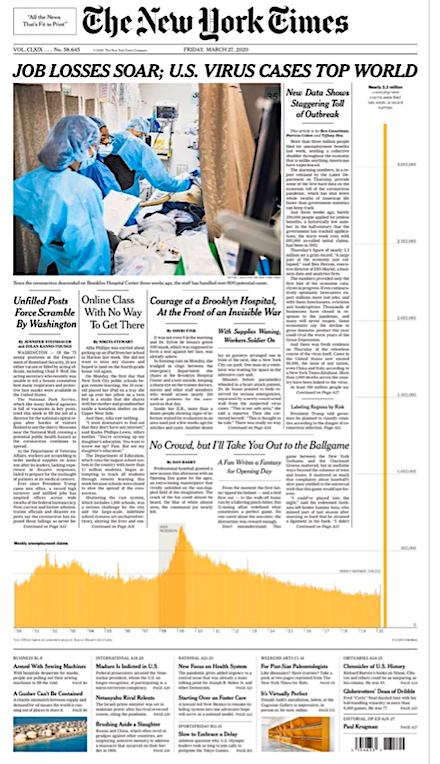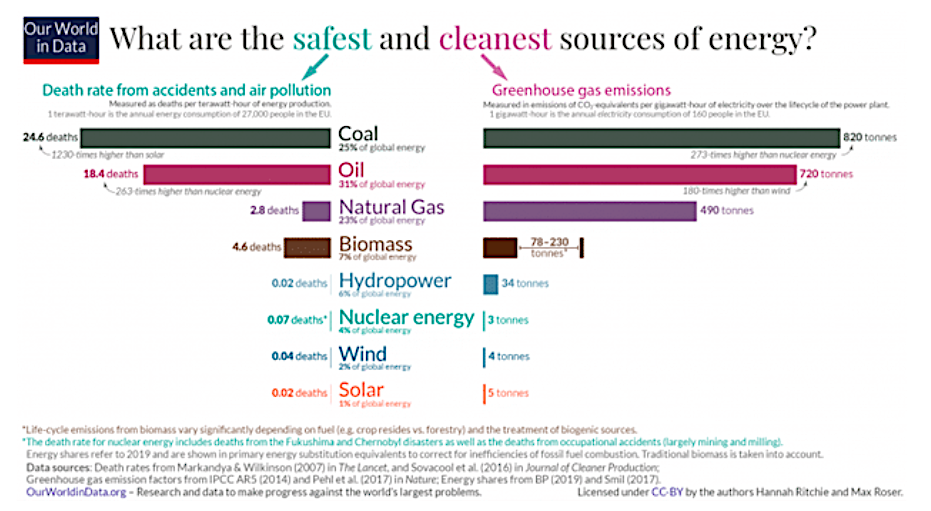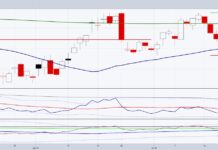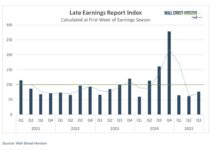Over the past two years, investors have had to balance fear and greed amidst market, economic, and political unpredictability. Since 2020, the divergence between asset price performance and fundamentals has never been starker.
As a reminder, stock prices were surging higher in the spring and summer of 2020 despite double-digit unemployment and closures of large economic segments. It was not easy to be bullish with news like the New York Times front-page.
The stock market bottomed the week this headline was published.
Since then, the S&P 500 has more than doubled. Those investors who could silence their fear and focus on technical signals and fiscal and monetary stimulus prospered.

Simultaneous feelings of fear and greed were overwhelming and detrimental to many investors over the past two years.
As we look ahead, we believe those same emotional biases will hinder investors. In this piece, we examine two biases that often handcuff investors and push them to make the wrong decisions at the wrong time. Our intention to make you aware of these subconscious forces is to help you manage both fear and greed and, ultimately, your wealth.
Availability Bias – Fear
Proposals for new nuclear power plants often come under resounding negative pressure from local communities. According to Britannica, the phrase NIMBY (not in my backyard) was coined because of the “threat” of new nuclear power plants.
Ask your friends or neighbors, and they would likely be distraught at the prospect of a nuclear power plant in their neighborhood. The reason is Three Mile Island, Fukushima, and Chernobyl in most cases.
Nuclear power plant disasters, while very rare, are extremely powerful in terms of the public’s perception of nuclear power. No one wants nukes in their backyard, despite the fact they are low cost, reliable, and produce no carbon emissions. As the graph below shows, nuclear energy is not only one of the greenest forms of energy production, but it is also the safest.

Availability bias occurs when people base their sense of risk on examples that quickly come to mind when a topic arises. When most people think of nuclear energy, Chernobyl, Three Mile Island, and Fukushima are top of mind.
Our collective availability bias against nuclear energy arguably results in more environmentally unfriendly, costlier, and deadlier energy options. Simply it causes us to make poor risk/reward decisions.
Availability Bias – Market Crashes
Investors can face the same crippling fear that nuclear energy protestors harbor.
The years 1929, 1987, 2000, and 2008 elicit anxiety from investors. Those four stock market crashes erased massive wealth in relatively short periods. Many people believe the crashes appeared out of the blue with no ability to detect them in advance.
The reality is all four were predictable. Timing a crash is difficult but quantifying the risk of a crash and the conditions leading to a crash are manageable. For example, we wrote 1987 to highlight plenty of fundamental and technical warnings in advance of the most significant single-day market crash.
The combination of high valuations and the fear of a market crash inevitably left many investors over the last year on the sidelines. While such a stance may prove correct in the longer run, those investors are sorely missing the ability to compound wealth in the shorter run. In the case of availability bias, investors are putting too much emphasis on risk and not enough time properly managing the risk.
Herd Mentality – Greed
It is often at market peaks that investors fail to appreciate risk and instead follow the bullish herd. Jim Cramer, for example, and many others make a living promoting bullish views. They thrive in bull markets. When markets roar ahead, extreme optimism and promises of much higher prices make the promoter’s siren songs hard to ignore.
Famed investors, Wall Street analysts, and the media prey on ill-equipped investors by justifying high valuations and forecasting ever-higher prices. Their narratives rationalizing steep valuation premiums and bold return forecasts become widespread. To some, they appear to be facts. Despite evidence to the contrary and historical precedence, investors buy the hype. “This time is different,” say the promoters.
As bull markets run at full steam, the call of the promoters elicits a fear of missing out (FOMO) or behavioral herding. Most investors blindly mimic the behavior of other investors without seeking the rationality behind it.
“There is nothing so disturbing to one’s well-being and judgment as to see a friend get rich” -Charles Kindleberger: Manias, Panics, and Crashes
In the case of herd mentality, we fail to manage risk as we become so focused on rewards.
Straddling the Line
In 1999, we showed current equity valuations are as extreme as those periods leading to the four crash events. A 40-50% market decline or even more would be statistically expected. There is no doubt our risk awareness should be on high alert. Blindly following your friends, neighbors, and Jim Cramer is a recipe for disaster. Do not ignore the palatable risks.
While blindly following the herd is dangerous, focusing too heavily on prior market crashes is also problematic. There is no golden rule that says markets must correct when they appear too expensive. Valuations may stay grossly elevated this year and next year. It’s also feasible, although highly unlikely, prices are stable, but valuations correct because earnings growth is fantastic.
Solely focusing on prior crashes and current extreme valuations may result in the inability to compound your wealth. If you sat out the last year, you missed outsized returns, which could have cushioned recent declines and made risk management a little easier.
Summary
Zen-like awareness allows us to run with the bulls and hide from the bears.” – Zen and the Art of Risk Management
Growing wealth is complex, especially when markets are at extremes like today. Worrying about 1987 or 1929 can leave you woefully underinvested while markets roar ahead. Blindly following stock promoters may leave you dangerously at risk.
As important as it is to think for ourselves, it is equally important to understand our psychological makeup. A strong understanding of a market’s technical and fundamental backings and the ability to fend off the urges of fear and greed is the equation for long-term investment success. Such is far from easy, which helps explain why so few investors continually make fortunes over decades.
Twitter: @michaellebowitz
The author or his firm may have positions in mentioned securities at the time of publication. Any opinions expressed herein are solely those of the author, and do not in any way represent the views or opinions of any other person or entity.







